We are Shaping the Future! Showcasing Success Stories as We Innovate for a Sustainable Tomorrow
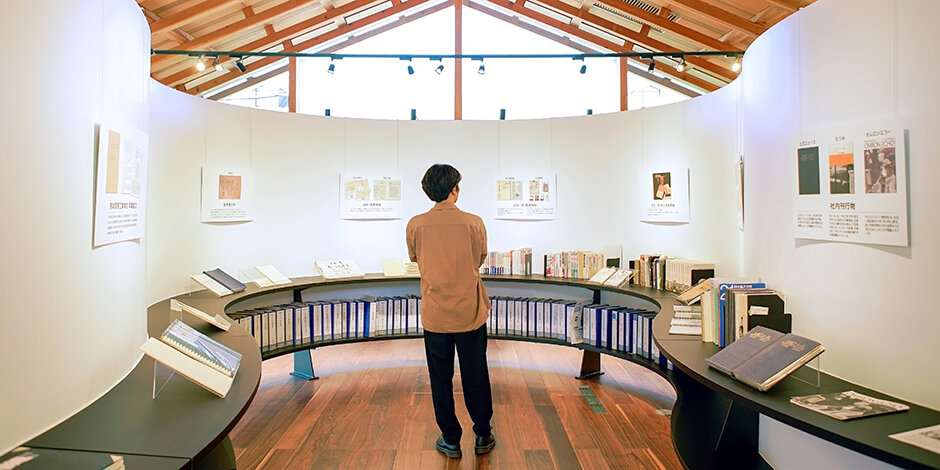
Did you know that the five-day working week system did not take root in Japan until the 1980s?
The work style that involves two days off per week, which is the norm today, was far from commonplace prior to end of the Showa period in 1988.
The turning point came with the introduction of the ATM. This allowed economic activity across society to continue even when bank teller counters were closed, so financial institutions could adopt a two-day weekend. Other employers soon followed suit, and the system spread across the whole of society.
The ATM is one of the many innovations conceived by OMRON's founder, Kazuma Tateishi. Born in 1900, Tateishi can be seen as a figure who designed the shape of work and the shape of society.
Even today, OMRON is home to business designers who seek to design society and create mechanisms for the pursuit of profit.
In this series of interviews, we explore the organization and activities of the Innovation Exploring Initiative HQ (IXI), OMRON's platform for creating business innovations to help solve social problems. For this article we visited the Kazuma Tateishi Founder's Memorial Hall together with Tatsuya Honda, a business designer from IXI.
The Memorial Hall is the former dwelling and garden of OMRON's founder, Kazuma Tateishi, which has been renovated as a space where current OMRON employees can get a sense of founder's thinking and way of living. Materials such as personal notes, meeting minutes, and books that the founder read are all preserved here in the space where he actually spent much of his time.
In this place, where you can sense the presence of the man who grew OMRON into a global company while continuing to solve social issues, we present an encounter between the founder and a present-day business designer to tease out the relationship between designing society and the pursuit of profit.
Person Featured in this Article
Tatsuya Honda, Business Designer, Innovation Exploring Initiative HQ (IXI), OMRON Corporation. Started his career as a designer in the Japan office of a foreign-owned design firm. Worked as a design strategist in a consulting firm before joining IXI. Leader of IXI's business designer team.
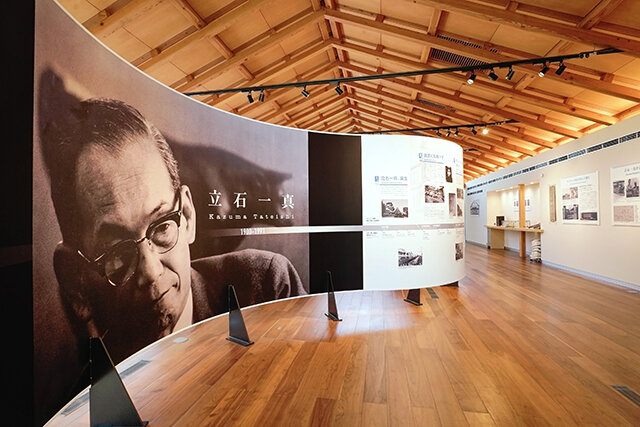 ŃĆĆ
ŃĆĆHONDA: The more I learn about Kazuma Tateishi, the more intrigued I am. There are so many layers to explore. People often highlight his work as a technologist and business manager, but personally, I think he was a designer.
Born in 1900, Tateishi was the one who formulated and gave concrete shape to innovations such as the automated ticket gate and the ATM. Thanks to the introduction of the ATM, banks shifted to a five-day working week. Other employers followed suit and the system spread across the whole of society. So Tateishi's work has had a great impact on Japanese society from the postwar period through to the present day.
Tateishi also sought to optimize human mobility, envisaging that Japan would face overcrowding problems during the high economic growth period. His development of an electronic traffic signal device that adjusts the timespan of red and green lights in line with traffic data has helped alleviate congestion on our roads, while automated ticketing gates at rail stations have made passenger flows more efficient.
When designers create something, they give shape to a vision of how their creation will connect with the future. Tateishi imagined the future, identified the kind of problems society would face, and gave concrete form to things that society would need. Surely, he was a true designer.
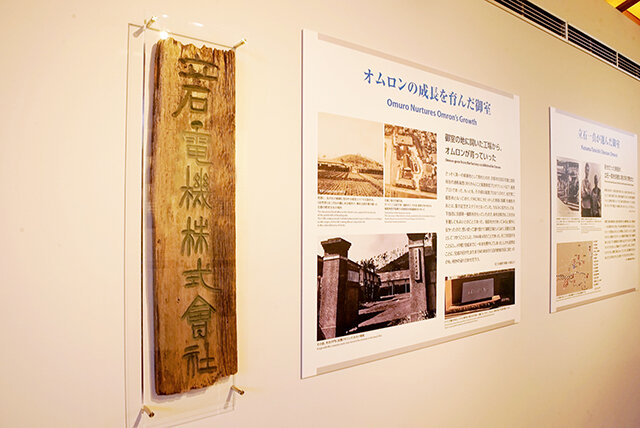 ŃĆĆ
ŃĆĆHONDA: Tateishi had outstanding vision: he looked into the future and launched a series of business activities designed to tackle social issues that may arise in the future. He placed high value on the idea of "working for the benefit of society."
The first thing that surprised me when I joined OMRON was that individual employees used the question "will it help solve social issues?" as the basis for determining their own actions. There's a tangible sense that the OMRON Principles have permeated the thinking of all our people.
While OMRON's key proposition is that it's a company that solves social issues, what transformed Tateishi Electric, a company that began with just two employees, into the global corporation we now know as OMRON was that Kazuma Tateishi's commitment to serving society was accompanied by an intensely business-minded outlook.
Tateishi worked to ascertain the needs of society, use his company's technologies in combination to deliver new solutions, and invest the profits in further research and development to address the next social issue. He was a person who set his sights on social issues and was able to achieve both social transformation and business expansion, with no inherent contradiction between the two.
As a business designer, I'm always thinking about how to balance the task of designing society with the pursuit of profit, so in this sense my work has much in common with Tateishi's approach.
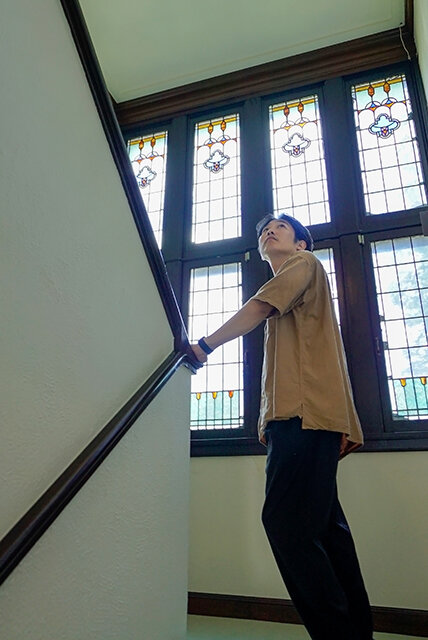 ŃĆĆ
ŃĆĆHONDA: I feel that Tateishi was the kind of person who valued the intuitive feeling of delight in things. His love of films led him to build a factory in Uzumasa (a center of film production in Kyoto); he painted pictures with his wife; he appreciated songs. I see him as a person brimming with curiosity.
He enjoyed hobbies and valued time with his family. I feel that this kind of ambition to enrich his own life and pursue happiness for himself became the driving force for Tateishi's work to tackle social issues.
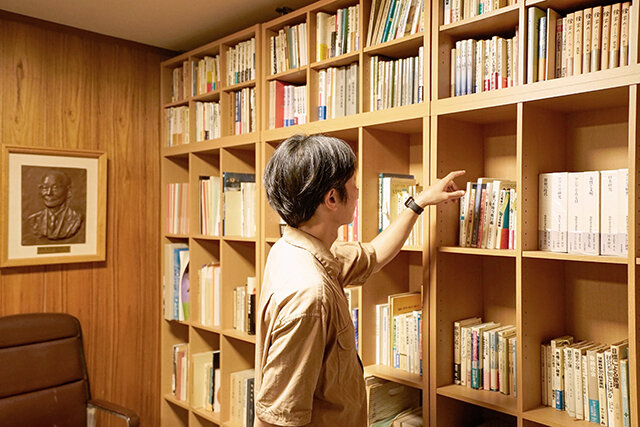 ŃĆĆ
ŃĆĆHONDA: As you trace Tateishi's life through the Memorial Hall, you realize that his starting points were intuition and curiosity. New ideas stemmed from unexpected encounters, and things that at first seemed unconnected came together to create new business activities.
It's often said that good design requires you to be both intuitive and logical, and I think Tateishi had both those traits. Surely, they provided the catalyst for his ideas that transcended conventional boundaries, such as industrial automation, social infrastructure, and healthcare.
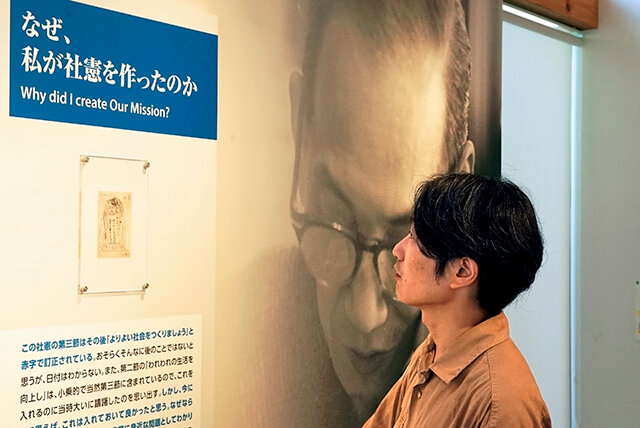 ŃĆĆ
ŃĆĆHONDA: Feelings like curiosity and delight in things include an element of self-interest, in that you're allowing yourself to do something because you enjoy it, or feel it will give you happiness. You can sense this in the handwritten "Our Mission" statement that Tateishi left for us.
"To improve lives and contribute to a better society"
The commitment "to improve lives" includes both oneself and the world at large. Tateishi cherished the spirit of social service, but I believe he made himself happy at the same time.
There is a link between our work to make a better society and enriching our own lives as individuals.
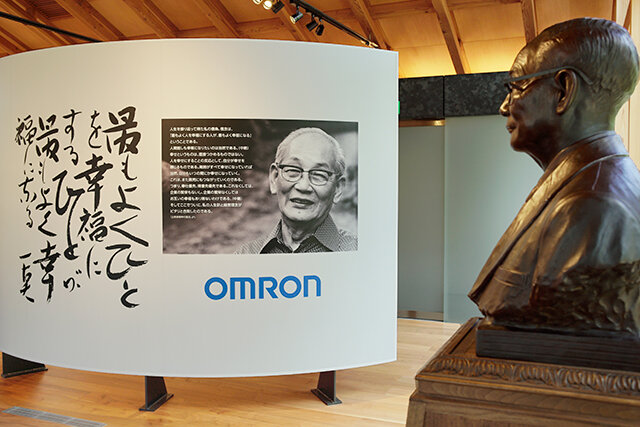 ŃĆĆ
ŃĆĆTo talk of solving social problems and making money in the same breath might be considered unscrupulous. But the fact is that in order to create something and sustain it over time, you need funding of some kind. Whether the funds come from tax revenue or profits generated by the business itself is not a question of right and wrong, is it?
HONDA: In order to create a better society, we need to design business itself in a way that tackles social issues as well as making the mechanisms by which we do so viable in business terms. The business designers here at IXI apply the power of business and design to the solution of social issues.
While we have a sense of mission toward wider society, we're also committed to realizing our own happiness. I believe that this is something we have in common with our founder, Kazuma Tateishi.
Tateishi used to say, "the people who make others the happiest are also the ones who achieve the greatest happiness for themselves." These words, which seem both altruistic and self-serving give a sense that Tateishi's was not prepared to give up on either front.
I feel that what Tateishi is telling us is that it's okay to pursue your own happiness at the same time as achieving designs that bring happiness to society.
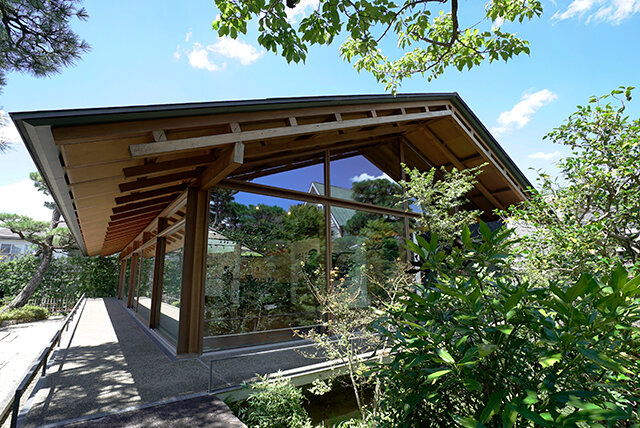 ŃĆĆ
ŃĆĆIn a quiet residential area of Kyoto known as Omuro, there is a space designed for current employees to get to know the founder who built their company into a global corporation in just one generation. By coming to this Memorial Hall and taking the time to ponder what Kazuma Tateishi thought and what he felt, OMRON employees are inheriting the founder's DNA.
In this article we traced the footsteps of Kazuma Tateishi, who founded OMRON here in Omuro, and contemplated how social design can be balanced with the pursuit of profit. If this has kindled your interest in business design as the art of making yourself happy at the same time as improving society, would you like to take the challenge yourself?
ŃĆĆ
*Access to the Kazuma Tateishi Founder's Memorial Hall is restricted to OMRON employees only. Please be aware that it is not open to the general public.
For more information about the Innovation Exploring Initiative HQ (IXI), visit:
https://www.omron.com/global/en/technology/future/